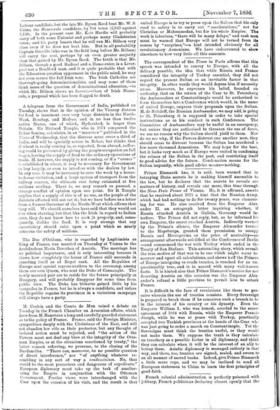The correspondent of the Times in Paris affirms that this
speech was intended to convey to Europe, with all the delicacy possible, the idea that while Russia and France considered the integrity of Turkey essential, they did not regard the present Sultan as an inevitable factor in that integrity. In other words they would depose him if necessity arose. Moreover, he expresses his belief, founded on authority, that on the return of the Czar to St. Petersburg the Ambassadors at Constantinople would be authorised to form themselves into a Conference which would, in the name of united Europe, impress their proposal') upon the Sultan. M. de Nelidoff, the Russian Ambassador, we may add, is going to St. Petersburg it is supposed in order to take special instructions as to his conduct in such Conference. The Committee of Ambassadors may be useful in an emergency, but unless they are authorised to threaten the use of force, we see no reason why the Sultan should yield to them. Nor do we see why, if the Powers distrust one another now, they should cease to distrust because the Sultan has murdered a few more thousand Armenians. We may hope for the best, but it looks very much as if Europe were united in condoning the crimes of the Sultan in the past, and restricting itself to good advice for the future. Condonation means for the Sultan impunity, while good advice means—nothing.


















































 Previous page
Previous page